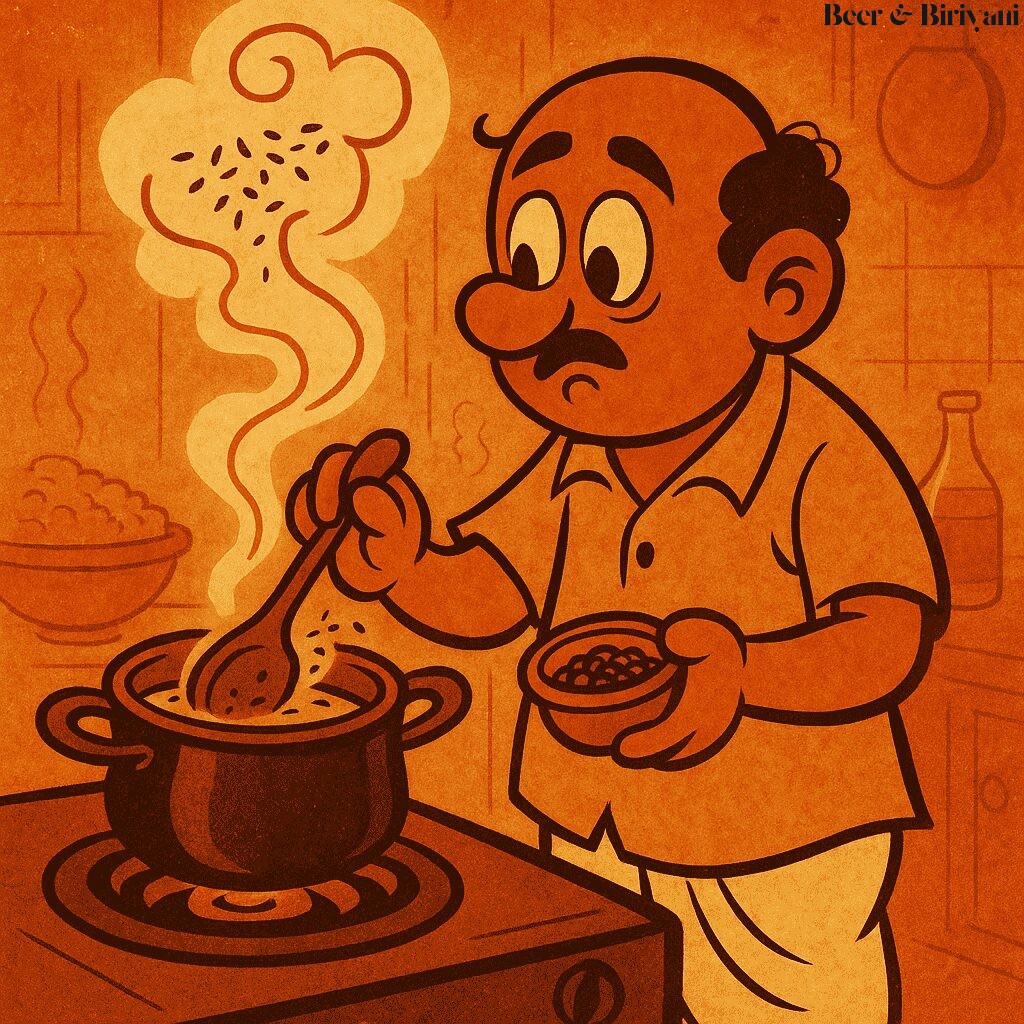It happens when I least expect it. I’m in my Austin kitchen, sautéing onions or maybe just heating oil for dal, and the moment that first cumin seed hits the pan—pop!—I have to pause. The aroma is instant, earthy, smoky, and unmistakable. A little sharp. A little sweet. I close my eyes. And just like that, I’m back in Mumbai, standing at the threshold of our old kitchen, barefoot on cold tile, watching my mother cook dinner in the fading evening light.
It’s not nostalgia exactly. Nostalgia is tidy. This is messier—sharper at the edges. The scent of jeera (cumin) in hot oil doesn’t just remind me of home. It transports me there. Not in the poetic, postcard way, but in a way that’s visceral. The air in the kitchen changes. The memory becomes smell, the smell becomes emotion, and suddenly I’m blinking faster than I need to.
The Smallest Things Hold the Most
It’s strange, the way memory clings to small things. We expect it from photographs or old songs. But cumin? That humble brown seed that crackles in tadka? Turns out it carries more emotional weight than half my school report cards combined.
Growing up, cumin was everywhere. My mother’s kitchen was built on a foundation of jeera and garlic. It went into tempering for dals, into aloo sabzi, into the pressure cooker with the rice. My grandmother used to toast it and grind it into a coarse powder we’d sprinkle over chaas. Even our post-feast burps on Sunday afternoons smelled faintly of cumin. We were a jeera-forward family.
But the moment that gets me, every time, is that first hit—the second it hits the oil. Because that was always the first step. The beginning of the meal. The start of evening. The time when the world slowed down, homework shifted to the background, and someone was home, cooking for you.
The Science of the Scent
Cumin is a deeply aromatic seed from the parsley family. Native to the eastern Mediterranean and India, it’s been a staple of spice trade routes for centuries. Its warm, nutty flavor and sharp aroma come from essential oils, especially cuminaldehyde, which is what you’re smelling when it hits hot fat. And for all the history and science packed into that seed, what it triggers in me isn’t knowledge. It’s memory. Emotion, even grief, held together by the scent of a spice that costs 99 cents for a packet at the Indian store on Burnet Road.
Maybe that’s why it hits so hard. Because it’s ordinary. Familiar. And because in that ordinariness, it feels like my mother never really left. That some part of her—her cooking, her voice yelling “don’t let it burn!” from another room, her habit of waving the ladle like a conductor—still lingers in that puff of steam from the pan.
Presence in the Absence
I’ve lived in the US for almost two decades now. I’ve learned how to fix leaky taps, do my own taxes, even make laal maas without crying. But the kitchen is where I still stumble. Not because I can’t cook, but because cooking forces me to remember. And smell—especially cumin—doesn’t ask for permission. It just arrives. Suddenly, you’re holding a spatula and holding back tears, and your kid walks in asking if dinner’s ready, and all you can say is, “In five minutes.”
Some days I miss her so quietly it doesn’t even feel like missing. Just an ache that sits behind your ribs. But then you open the tin of cumin and toss a pinch into the oil, and the ache rises like steam. This is how memory lives in the body. Not just in thoughts, but in scents, in flavors, in muscle memory as your hand reaches for the masala dabba without thinking.
A Quiet Ritual
I try to carry on the ritual. Not just for myself, but for my son. He’s ten now. Born in Austin, speaks better Spanish than Hindi, and thinks jeera rice is “fancy Indian food.” But he knows the smell. When I’m in the kitchen, and the cumin hits the oil, he’ll wander in and ask, “You making that dal thing again?” And I smile. Because maybe one day, when he’s in a kitchen far from here, he’ll toss cumin into a pan and think of home too.
Food is inheritance. Not just the recipes, but the feelings they carry. And in my house, cumin is the keeper of those feelings. It’s the start of every dinner. The ghost in the room. The reason I still pause, every single time, when that smell rises. And maybe—just maybe—that’s what love smells like. Sharp, warm, surprising, and always just a little too much to bear.
Born in Mumbai, now stir-frying feelings in Texas. Writes about food, memory, and the messy magic in between — mostly to stay hungry, sometimes just to stay sane.












